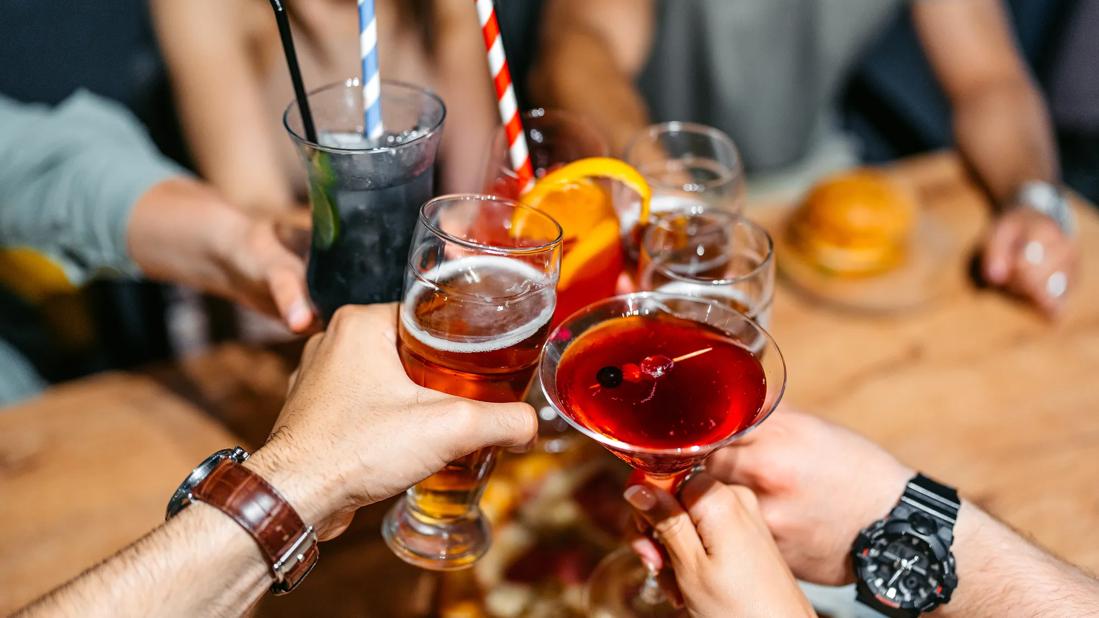Drinking alcohol can cause nerve pain, dehydration and weight gain, which can all lead to back pain

Image content: This image is available to view online.
View image online (https://assets.clevelandclinic.org/transform/5b597073-d97f-43ed-951c-5e8e2aabb17a/drinking-alcohol-with-friends-2161598082)
Multiple hands and a variety of glasses and drinks raised together in a toast
You may be familiar with a lot of the advice for preventing or lessening back pain. Strengthen your core. Practice good posture. Stretch more. But there’s a lesser-known tip to consider, too: Reduce your alcohol consumption.
Advertisement
Cleveland Clinic is a non-profit academic medical center. Advertising on our site helps support our mission. We do not endorse non-Cleveland Clinic products or services. Policy
Can drinking alcohol really cause back pain? Pain management expert Tara-Lin Hollins, MD, discusses the possible association between alcohol and back pain.
Experts haven’t identified a direct connection between alcohol and back pain. Still, some believe there may be a slight association — mainly in people who already experience back pain and those with alcohol dependence. Up to 85% of people in the U.S. experience back pain in their lifetime. And 28% of people with chronic pain turn to alcohol for relief. So, it can be helpful to understand possible connections between the two.
Dr. Hollins says that if you follow guidelines for moderate drinking and don’t currently have back pain, there’s no reason to believe that alcohol will cause you to develop new pain. But if you experience some back pain or drink heavily and often, alcohol may lead to worsened back pain over time.
“There are many reasons you may experience back pain,” Dr. Hollins says, “and alcohol can be associated with or even cause many of those issues. So, while heavy drinking may not directly cause back pain, it may contribute to it.”
There are a few ways that drinking alcohol can worsen your existing back pain. Dr. Hollins explains the indirect connections between alcohol use and back pain.
Advertisement
Feel like you have to visit the bathroom more often whenever you’ve had a few drinks? There’s a reason for that: Alcohol blocks your body’s production of vasopressin, the hormone responsible for regulating water in your body. When vasopressin can’t do its job, you pee more than you should, which leads to dehydration.
Back pain associated with dehydration may include:
“Alcohol is a natural diuretic, and the dehydration that it causes can trigger muscle pain and lower back discomfort,” Dr. Hollins reiterates. “When someone comes in with spasms, one of the first things we do is check their electrolytes and hydration level.”
Another connection between alcohol and the nervous system: People with alcohol dependence are at risk of developing alcohol-related neuropathy — nerve pain caused by the toxic effects of alcohol. The pain from alcohol-related neuropathy typically occurs in your legs (peripheral neuropathy), but this demonstrates the effects alcohol can have on nerves.
“If your existing back pain is associated with neuropathic pain or involves nerves at all, alcohol could potentially make it worse,” Dr. Hollins says.
She adds that many vitamins, including vitamin B and vitamin D, are involved in keeping nerves healthy and pain-free: “When you drink alcohol, you can strip your body of many of these vitamins and allow nerve pain to surface,” she notes.
The empty calories in alcohol can contribute to contribute to weight gain, especially when paired with a calorie-heavy diet. Plus, heavy drinking and binge drinking have been shown to increase your risk of having obesity. And we know that weight can play a significant role in chronic lower back pain.
“Any added weight puts pressure on the spine,” Dr. Hollins explains. “Having stress and strain on the spine for a long period can add up, leading to arthritis and some level of chronic back pain.”
That may be especially true as you age. One study found that in people over the age of 50, the greater the amount of weight gain, the higher the association with an increased risk of chronic lower back pain.
If you do have existing back pain and plan to consume alcohol, follow these recommendations for drinking safely:
Advertisement
“Making healthy lifestyle choices, including the decisions you make around alcohol use, is the best way to keep your back healthy,” Dr. Hollins emphasizes.
Advertisement

Sign up for our Health Essentials emails for expert guidance on nutrition, fitness, sleep, skin care and more.
Learn more about our editorial process.
Advertisement
Hanging upside down for any length of time may decompress the tension in your spine
Your sleep position, immobility, mattress and underlying conditions can all cause morning back pain
Rest may be all you need to get rid of running-related lower back pain
It’s always a good idea to let a healthcare provider know about any back pain you’re experiencing, especially if it results from trauma or persists longer than three months
From physical and biofeedback therapy to nerve ablations and blocks, there are many nonsurgical options for managing back pain
Rest, physical therapy, acupuncture and nerve blocks are just a few ways to find relief
Get moving, use cold packs, and try yoga and stretches to ease back pain
Back spasms, shingles and disk conditions can all feel like a burning sensation
Although it could be used as a moisturizer, this new trend is not recommended
Communicating clear limits helps protect your time, energy and emotional well-being
High cholesterol can be genetic, but testing and treatment can lower your heart disease risk